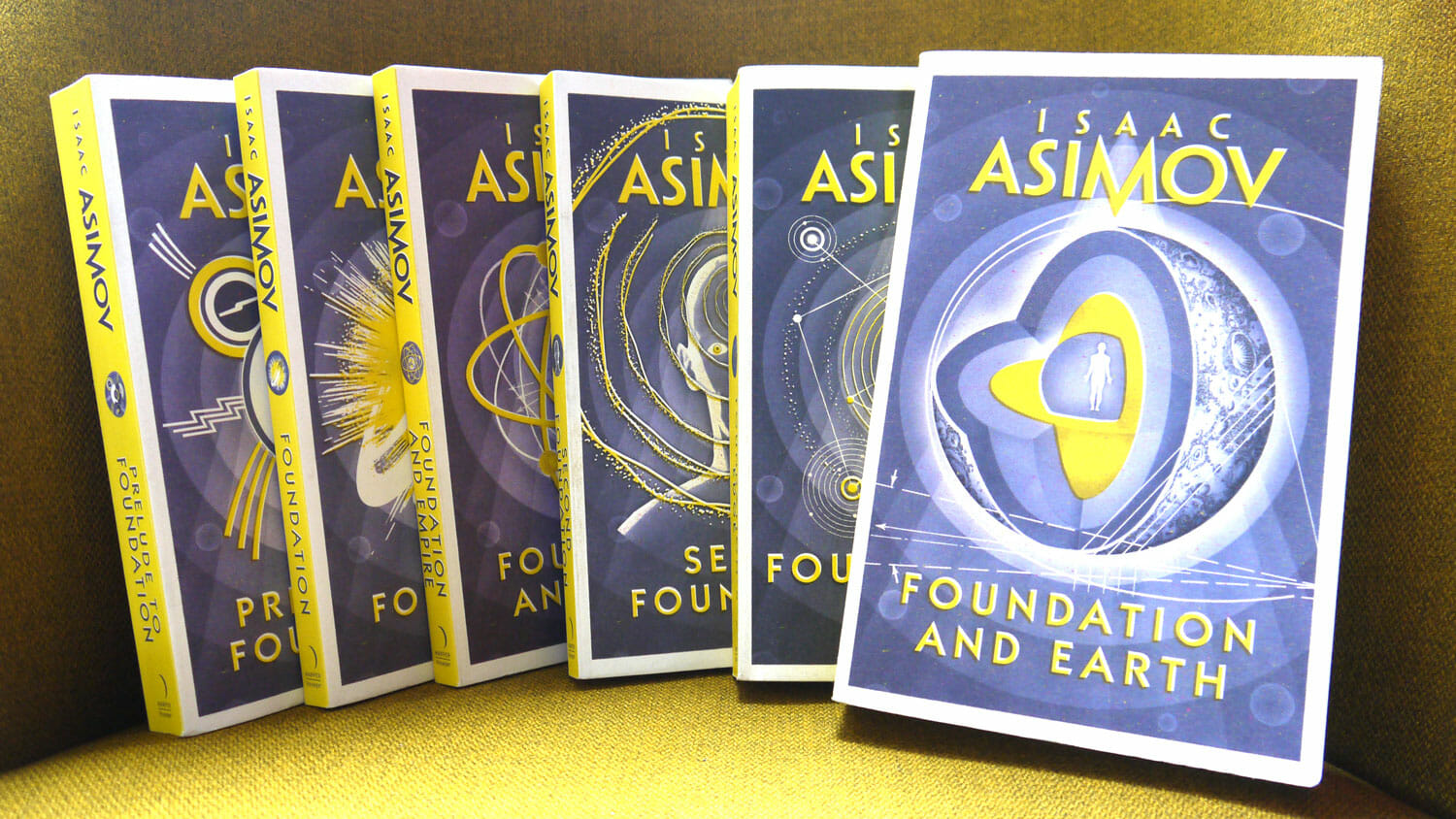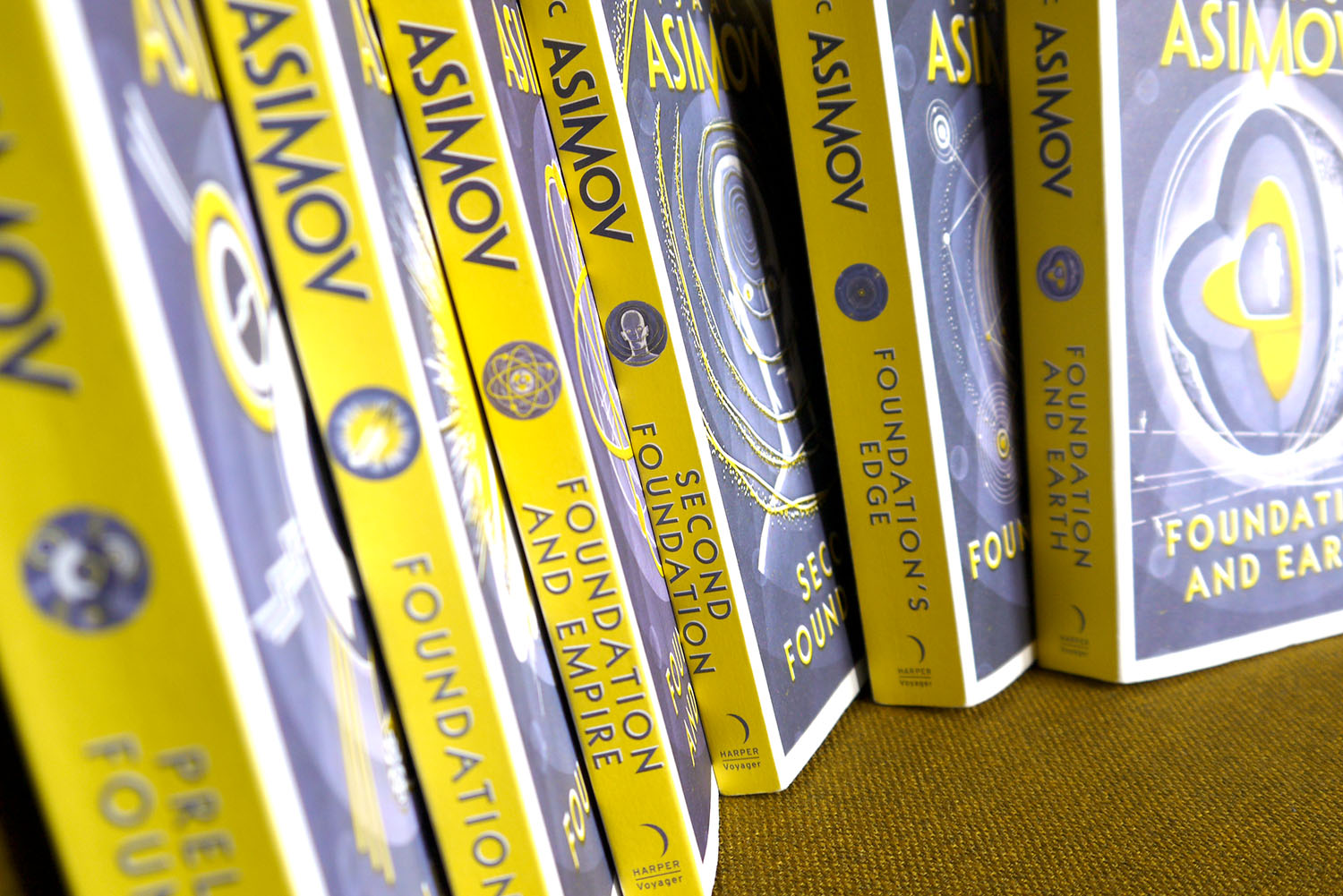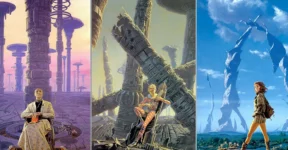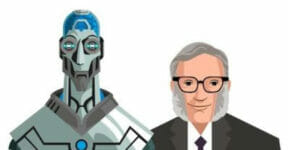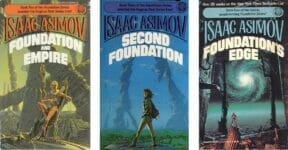The Foundation book series is one of Isaac Asimov’s earliest and best-known works. It is often credited with redefining the science fiction genre thanks to its smart and seamless interweaving of pure imagination with real scientific facts. There are seven books in the series as listed below.

Prequel novels
- Prelude to Foundation (1988): humans have colonized the Milky Way Galaxy and are united under one Galactic Empire, ruled by the oppressive Emperor Cleon. A young mathematician named Hari Seldon develops a mathematical method to predict human behaviors. His theory is known as psychohistory.
- Forward the Foundation (1993): Hari Seldon has the freedom to advance the theoretical concept and put it to practical implementation. He is now able to predict how the population will react to certain stimuli with reliable accuracy. Based on his psychohistory analysis, he believes the empire is on the brink of destruction. There needs to be a plan to save the future of civilization.
Original Trilogy
- Foundation (1951): Seldon is convinced the Empire only has about 300 years left before everything turns into an uncontrollable galactic riot. Since the collapse is inevitable, he establishes the Foundation on an isolated planet to preserve scientific knowledge. In exile, he is safe from the chaotic empire.
- Foundation and Empire (1952): the prediction about the collapse of the Empire proves to be accurate. As a matter of fact, the Foundation has grown to a level of sophistication far more advanced than the Galactic Empire itself. That said, the empire still has the most powerful Navy everywhere despite the technological decline. Still doomed to fail according to psychohistory, the Foundation is on its way toward total dominance across the galaxy.
- Second Foundation (1953): the Foundation has undergone several transformations from a repository of human knowledge into technology superpower before shifting toward liberal economy until eventually becoming an actual kingdom on its own. It marks the rise of the Second Foundation, essentially a better version of the old Galactic Empire.
Sequel novels
- Foundation’s Edge (1982): after more than 4 centuries since the exile, the First and Second Foundations are on a collision course.
- Foundation and Earth (1986): it is about the search for the Earth. The last novel in the series establishes a link between the Foundation and Robot series and combines them into a single fictional universe. The macro-plots and loose ends are well connected and tied up.
With all the talk about technology, interstellar travel, and laser blasters, we think the Foundation is not strictly science fiction. Every farfetched gadget and clone only plays minor part in the story. Isaac Asimov is describing a society and how it will evolve over time. By the end of the original trilogy, the development sounds quite familiar simply because it resembles 20th-century America. Seldon’s psychohistory is most likely a representation of social science in general, and how it might be useful to help shape inevitable changes in every society in the world.
TV Adaptation
Some book series are considered unfilmable because of their sheer complexity. Dune by Frank Herbert was once notoriously difficult to adapt to the screen, but only until a successful movie came along in 1984 and a remake in 2021. There had been multiple attempts before, and all were underwhelming. It is the same thing with the Foundation series by Isaac Asimov; New Line Cinema made the attempt to produce a big screen adaptation, but the project failed to materialize and so did Columbia Pictures with the same result. Now, there is an ongoing TV show based on the novel series, created by David S. Goyer and Josh Friedman, streaming on Apple TV+. Its first season ran for 10 episodes from September to November 2021. The second season is in production.
Like in the source material, the TV series tells the story of civilization under the Galactic Empire in the far-flung future. It is an empire ruled by a trio of emperors named Brother Dawn, Brother Day, and Brother Dusk; all are clones of the original Emperor Cleon. And then there is Hari Seldon, a genius mathematician who can scientifically predict the behavior of human populations across centuries using his advanced “psychohistory” algorithm. Seldon predicts the empire will inevitably collapse in the somewhat near future and the galactic civilization will fall into a chaotic period for 30,000 years afterward. Science, history, art, and all the good traits of intellectual life will most likely end up destroyed. The good news is that Seldon has a plan to shorten the barbaric era into a mere thousand years. The bad news is no one in power likes to hear the prediction.
Now considered a threat to the ruling class, which has maintained power for so long through cloning, Seldon is sent away to an isolated planet called Terminus. Seldon and his group of followers establish the “Foundation” to preserve humanity’s knowledge and further study psychohistory. The Foundation becomes a beacon to guide humanity across generations through crises and conflicts.
By the modern standard of sci-fi novels, The Foundation Book Series is quite possibly judged as lacking mostly for its near total failure in creating proper character development, and in some cases, a complete absence of physical description. Much like the hi-tech devices, the characters are not exactly the main concerns; it is about how society develops and evolves over the course of millennia. Asimov brings the Galactic Empire and the sophisticated conflicts across the Milky Way back to Earth in the end—the true final frontier is the society we build, here at home, on Earth.
Other things you might want to know:
Does the series have any follow-up novels?
There is an expansion compiled into another sub-series called The Second Foundation Trilogy written by three different authors, commissioned (or authorized) by Asimov’s estate. The trilogy consists of:
- Foundation’s Fear (1997) by Gregory Benford
- Foundation and Chaos (1998) by Greg Bear
- Foundation’s Triumph (1999) by David Brin
Has it won any awards?
The Foundation Book Series received a special Hugo Award in 1996 for Best All-Time Series.
What other books written by Isaac Asimov?
Other than the Foundation book series, Isaac Asimov’s bibliography is filled with numerous other books and short stories. Among the most popular include the Robot series, Galactic Empire series, The End of Eternity, Fantastic Voyage, and The God Themselves, to name a few.
Check out other articles by month:

